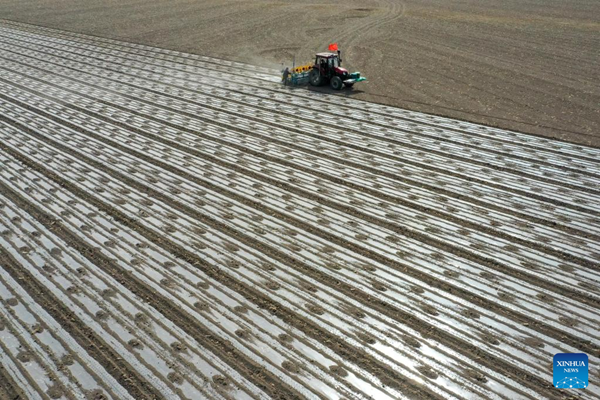Young people inject fresh impetus into rural areas of China’s Xinjiang
Many young people are fully leveraging the latest technologies and their talents in the rural areas of northwest China's Xinjiang Uygur Autonomous Region, making farm production more efficient and injecting a fresh impetus into the region’s countryside.

Aerial photo taken on April 19, 2022 shows a seeding machine guided by the BeiDou Navigation Satellite System working in a cotton field in a farm of a division of Xinjiang Production and Construction Corps in northwest China's Xinjiang Uygur Autonomous Region. (Photo/Xinhua)
A young team with an average age under 30 has been busy working in an experimental cotton field in Yuli county in Xinjiang. Here new technologies such as the Internet of Things, artificial intelligence (AI) and digital technologies are being applied to the farm work. Mechanization and a more precise management approach have been adopted for sowing seeds, field management and harvesting.
Mo Xiaoyu, 29, from central China's Hunan Province, is a professional photographer for the team. She has worked alongside the engineers on the team and helped to replace the old irrigation facilities used in the cotton fields with intelligent ones, as well as building an automated system for fertilization and irrigation, which is supported by remote control, after completing several trials.
“The sensors installed in the field measure indexes such as the moisture and pH of the soil in real time. After studying these figures, the system adjusts the amount of water and fertilizers, and sends them to the roots of the seedlings. In addition, AI technology can measure the growth and identify diseases and pest problems among the cotton by analyzing the photos captured by unmanned aircraft vehicles (UAVs),” explained Ai Haipeng, a 32-year-old member of the team, who added that an unmanned farm could reduce the cost of agricultural production, and also provides a reference point for pursuing a more scientific kind of field management.
“Our goal for this year is to produce 400 kilograms of cotton per mu (about 0.07 hectares), with unmanned operations covering 80 percent of the all the management procedures,” said Ling Lei, another team member.
Born in the 1990s, Qiu Changwei from Ganhezi town, Wusu city, Tacheng Prefecture in Xinjiang, works on promoting the use of agricultural UAVs for spraying pesticides with his company, hoping to work towards emancipating farmers from their laborious tasks.
To assure the farmers, he demonstrated how the UAVs can spray defoliant for major cotton growers and several cotton cooperatives located in the township. “A UAV doesn’t cause damage to the seedlings like conventional pesticide spraying machines. More importantly, it’s more efficient. It can finish the workload in a 1,000 mu cotton field in one day,” said Qiu proudly. He added that many farmers are willing to have a try.
Qiu plans to introduce some agricultural helicopters, and further expand his company’s business for spraying pesticide to include grasslands and forests.
Luo Hui, a young entrepreneur who was also born in the 1990s, established a company to help local farmers sell their agricultural products. Luo, who had tried various means to explore sales channels while still in college, established an e-commerce company in 2015 which sells local specialties such as apples from the Aksu Prefecture, pears from Korla, and red dates from Hotan.
“Relying on our strengths in e-commerce is not enough to realize greater development,” remarked Luo, who started to develop the whole business from scratch, beginning with building a processing plant in 2019.
“The integrated mode, which covers production, processing, packaging, shipment and sales, makes us independent from original equipment manufacturers, creates more job opportunities, and allows me to adjust the production capacity according to the need of the market,” said Luo confidently.
So far, the maximum daily orders for Luo’s company on all major e-commerce platforms has exceeded 70,000. And his company plans to build another plant this year, which is expected to generate even more jobs.
Photos
Copyright © 2022 People's Daily Online. All Rights Reserved.










